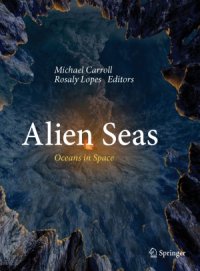
Ebook: Alien Seas Oceans in Space
Author: Michael Carroll Rosaly Lopes
Oceans were long thought to exist in all corners of the Solar System, from carbonated seas percolating beneath the clouds of Venus to features on the Moons surface given names such as «the Bay of Rainbows” and the «Ocean of Storms.» With the advent of modern telescopes and spacecraft exploration these ancient concepts of planetary seas have, for the most part, evaporated. But they have been replaced by the reality of something even more exotic. For example, although it is still uncertain whether Mars ever had actual oceans, it now seems that a web of waterways did indeed at one time spread across its surface.
The «water» in many places in our Solar System is a poisoned brew mixed with ammonia or methane. Even that found on Jupiters watery satellite Europa is believed similar to battery acid. Beyond the Galilean satellites may lie even more «alien oceans.» Saturns planet-sized moon Titan seems to be subject to methane or ethane rainfall. This creates methane pools that, in turn, become vast lakes and, perhaps, seasonal oceans. Titan has other seas in a sense, as large shifting areas of sand covering vast plains have been discovered. Mars also has these sand seas, and Venus may as well, along with oceans of frozen lava. Do super-chilled concoctions of ammonia, liquid nitrogen, and water percolate beneath the surfaces of Enceladus and Triton? For now we can only guess at the possibilities.
The «water» in many places in our Solar System is a poisoned brew mixed with ammonia or methane. Even that found on Jupiters watery satellite Europa is believed similar to battery acid. Beyond the Galilean satellites may lie even more «alien oceans.» Saturns planet-sized moon Titan seems to be subject to methane or ethane rainfall. This creates methane pools that, in turn, become vast lakes and, perhaps, seasonal oceans. Titan has other seas in a sense, as large shifting areas of sand covering vast plains have been discovered. Mars also has these sand seas, and Venus may as well, along with oceans of frozen lava. Do super-chilled concoctions of ammonia, liquid nitrogen, and water percolate beneath the surfaces of Enceladus and Triton? For now we can only guess at the possibilities.
Download the book Alien Seas Oceans in Space for free or read online
Continue reading on any device:

Last viewed books
Related books
{related-news}
Comments (0)